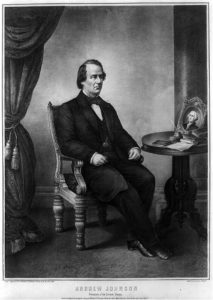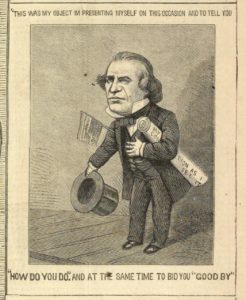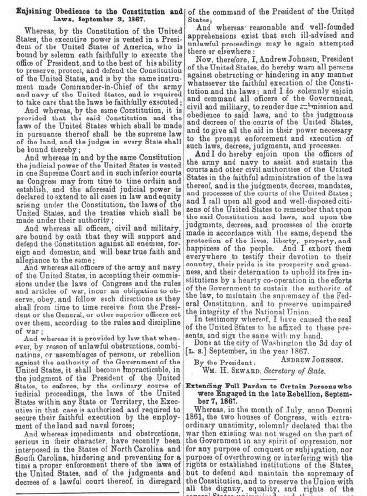150 years ago today President Andrew Johnson proclaimed an amnesty to cover almost all former Confederates. As recorded at Project Gutenberg:
BY THE PRESIDENT OF THE UNITED STATES OF AMERICA.
A PROCLAMATION.
Whereas in the month of July, A.D. 1861, the two Houses of Congress, with extraordinary unanimity, solemnly declared that the war then existing was not waged on the part of the Government in any spirit of oppression nor for any purpose of conquest or subjugation, nor purpose of overthrowing or interfering with the rights or established institutions of the States, but to defend and maintain the supremacy of the Constitution and to preserve the Union, with all the dignity, equality, and rights of the several States unimpaired, and that as soon as these objects should be accomplished the war ought to cease; and
Whereas the President of the United States, on the 8th day of December, A.D. 1863, and on the 26th day of March, A.D. 1864, did, with the objects of suppressing the then existing rebellion, of inducing all persons to return to their loyalty, and of restoring the authority of the United States, issue proclamations offering amnesty and pardon to all persons who had, directly or indirectly, participated in the then existing rebellion, except as in those proclamations was specified and reserved; and
Whereas the President of the United States did on the 29th day of May, A.D. 1865, issue a further proclamation, with the same objects before mentioned, and to the end that the authority of the Government of the United States might be restored and that peace, order, and freedom might be established, and the President did by the said last-mentioned proclamation proclaim and declare that he thereby granted to all persons who had, directly or indirectly, participated in the then existing rebellion, except as therein excepted, amnesty and pardon, with restoration of all rights of property, except as to slaves, and except in certain cases where legal proceedings had been instituted, but upon condition that such persons should take and subscribe an oath therein prescribed, which oath should be registered for permanent preservation; and
Whereas in and by the said last-mentioned proclamation of the 29th day of May, A.D. 1865, fourteen extensive classes of persons therein specially described were altogether excepted and excluded from the benefits thereof; and
Whereas the President of the United States did, on the 2d day of April, A.D. 1866, issue a proclamation declaring that the insurrection was at an end and was thenceforth to be so regarded; and
Whereas there now exists no organized armed resistance of misguided citizens or others to the authority of the United States in the States of Georgia, South Carolina, Virginia, North Carolina, Tennessee, Alabama, Louisiana, Arkansas, Mississippi, Florida, and Texas, and the laws can be sustained and enforced therein by the proper civil authority, State or Federal, and the people of said States are well and loyally disposed, and have conformed, or, if permitted to do so, will conform in their legislation to the condition of affairs growing out of the amendment to the Constitution of the United States prohibiting slavery within the limits and jurisdiction of the United States; and
Whereas there no longer exists any reasonable ground to apprehend within the States which were involved in the late rebellion any renewal thereof or any unlawful resistance by the people of said States to the Constitution and laws of the United States; and
Whereas large standing armies, military occupation, martial law, military tribunals, and the suspension of the privilege of the writ of habeas corpus and the right of trial by jury are in time of peace dangerous to public liberty, incompatible with the individual rights of the citizen, contrary to the genius and spirit of our free institutions, and exhaustive of the national resources, and ought not, therefore, to be sanctioned or allowed except in cases of actual necessity for repelling invasion or suppressing insurrection or rebellion; and
Whereas a retaliatory or vindictive policy, attended by unnecessary disqualifications, pains, penalties, confiscations, and disfranchisements, now, as always, could only tend to hinder reconciliation among the people and national restoration, while it must seriously embarrass, obstruct, and repress popular energies and national industry and enterprise; and
Whereas for these reasons it is now deemed essential to the public welfare and to the more perfect restoration of constitutional law and order that the said last-mentioned proclamation so as aforesaid issued on the 29th day of May, A.D. 1865, should be modified, and that the full and beneficent pardon conceded thereby should be opened and further extended to a large number of the persons who by its aforesaid exceptions have been hitherto excluded from Executive clemency:
Now, therefore, be it known that I, Andrew Johnson, President of the United States, do hereby proclaim and declare that the full pardon described in the said proclamation of the 29th day of May, A.D. 1865, shall henceforth be opened and extended to all persons who, directly or indirectly, participated in the late rebellion, with the restoration of all privileges, immunities, and rights of property, except as to property with regard to slaves, and except in cases of legal proceedings under the laws of the United States; but upon this condition, nevertheless, that every such person who shall seek to avail himself of this proclamation shall take and subscribe the following oath and shall cause the same to be registered for permanent preservation in the same manner and with the same effect as with the oath prescribed in the said proclamation of the 29th day of May, 1865, namely:
I, —— ——, do solemnly swear (or affirm), in presence of Almighty God, that I will henceforth faithfully support, protect, and defend the Constitution of the United States and the Union of the States thereunder, and that I will in like manner abide by and faithfully support all laws and proclamations which have been made during the late rebellion with reference to the emancipation of slaves. So help me God.
The following persons, and no others, are excluded from the benefits of this proclamation and of the said proclamation of the 29th day of May, 1865, namely:
First. The chief or pretended chief executive officers, including the President, the Vice-President, and all heads of departments of the pretended Confederate or rebel government, and all who were agents thereof in foreign states and countries, and all who held or pretended to hold in the service of the said pretended Confederate government a military rank or title above the grade of brigadier-general or naval rank or title above that of captain, and all who were or pretended to be governors of States while maintaining, aiding, abetting, or submitting to and acquiescing in the rebellion.
Second. All persons who in any way treated otherwise than as lawful prisoners of war persons who in any capacity were employed or engaged in the military or naval service of the United States.
Third. All persons who at the time they may seek to obtain the benefits of this proclamation are actually in civil, military, or naval confinement or custody, or legally held to bail, either before or after conviction, and all persons who were engaged, directly or indirectly, in the assassination of the late President of the United States or in any plot or conspiracy in any manner therewith connected.
In testimony whereof I have signed these presents with my hand and have caused the seal of the United States to be hereunto affixed.
[SEAL.]
Done at the city of Washington, the 7th day of September, A.D. 1867, and of the Independence of the United States of America the ninety-second.
ANDREW JOHNSON.
By the President:
WILLIAM H. SEWARD,
Secretary of State.
An editorial saw the proclamation as an attempt by the president to wrest some reconstruction policy away from the absent Congress and worried that it might stir up the former rebels to increased hostility toward the federal government and its representatives. From The New-York Times September 9, 1867:
The Amnesty Proclamation.
The precise terms and scope of the Amnesty Proclamation are of are of comparatively small moment. The assertion by the President of his right to issue such a proclamation at all, is the point which most concerns the country. The pardon of a few rebels, more or less, is not worth squabbling about, if he wields the power implied in a general declaration of amnesty. …
The true place for amnesty is after reconstruction. It would then be available as a recognition of compliance with the law on the part of the Southern people. It would then entail no risk, and encounter but slight hostility. As proclaimed by Mr. JOHNSON, it is a premium on disloyalty and an incentive to opposition. Instead of pacifying the country, it will add to its disturbing influences; instead of hastening Southern peace, and promoting the reconciliation of the sections, it will encourage rebels to renewed disorder, and will most likely delay the completion of the task which Congress has undertaken. The people will be satisfied with nothing less than sure and thorough work, and they will have it, though Mr. JOHNSON send forth a proclamation daily until the meeting of Congress. Thereafter his sign-manual will attract much less attention.
Indeed, a few days earlier Andrew Johnson issued another proclamation. You can read it at The American Presidency Project. The September 3rd document zeroed in on the Second Military District (North and South Carolina); it seemed to be saying that the federal military in those states should support the civil authorities and courts of the United States. On August 26th the president removed Daniel Sickles as commander of the Second District. Is he trying to get back some of his constitutional prerogatives vis-à-vis the absent Congress, which had earlier in the year taken over Reconstruction policy? He used the word “Constitution” ten times in the decree.
An editorial in The New-York Times on September 4, 1867 severely criticized the September 3rd proclamation on many grounds. It saw the influence of Acting Attorney General John Milton Binckley on the president’s proclaiming behavior. The editorial concluded that after November 21 (when Attorney General Stanbery returned?) “… Mr. JOHNSON will find the opinions and proclamations which are now manufactured to order, rudely treated as so much waste paper.”
From Hans Trefousse’s biography:
… the president continued his aggressive tactics. In a defiant mood, just before the fall elections, he again made his position clear by issuing a proclamation calling upon the army to sustain law and order as expounded by the civil courts in the Carolinas. A few days later he promulgated a general amnesty for all but the most prominent Confederates. Then he awaited the election results.[1]
From the Library of Congress: portrait; cartoon, which is part of “Andy’s Trip” by Thomas Nast published in the October 27, 1866 issue of Harper’s Weekly. You can find the image of the proclamation at Hathi Trust.
- [1]Trefousse, Hans L. Andrew Johnson: A Biography. New York: W.W. Norton & Company, Inc., 1997. Print. page 298.↩



